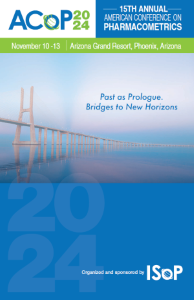Software & Tool Demonstration
(M-113) Oncology MIDD Simulator, A User-Friendly Application for Overall Survival Forecasting in Early Oncology Trials
Monday, November 11, 2024
7:00 AM - 5:00 PM MST
Mourad Hamimed, No – Scientist – Pharmacometrics, Certara Drug Development Solutions, Certara; Mathilde Marchand, No – Director – Pharmacometrics, Certara; Antonio Goncalves, No – Associate Director – Pharmacometrics, Certara; Vincent Duval, No – Sr. Director – Pharmacometrics, Certara; Mirjam N.Trame, No – Vice President, QSS-US-2 Region Lead, Certara Drug Development Solutions, Certara; Samer Mouksassi, No – Sr. Director – Pharmacometrics, Certara

Mirjam Trame, Ph.D (she/her/hers)
Vice President Pharmacometrics
Certara
Boston, Massachusetts, United States
Author(s)
Objectives: In the landscape of oncology drug development, overall survival (OS) is widely regarded as the gold standard endpoint for assessing treatment efficacy. However, due to the protracted timeline required for OS data to mature, surrogate endpoints like tumor growth inhibition (TGI) metrics are gaining traction in early phases for their ability to offer early insights into treatment efficacy. Several frameworks have been developed based on population pharmacokinetic-pharmacodynamic (PopPK-PD) modeling of early TGI data, aiming to predict survival outcomes across diverse settings [1–4]. Despite that, the linear workflow, which necessitates iterative communication between decision-makers and analysts, remains a significant challenge in utilizing such approaches routinely. To address this limitation, we developed an interactive application for model-informed drug development (MIDD) in oncology, empowering clinical development teams to efficiently utilize available information for early prediction of OS in solid tumor indications.
Methods: The “Oncology MIDD Simulator”, is a web-based application, with an intuitive graphical user interface. The web interface is constructed using R, JavaScript, HTML, and CSS programming languages. Currently, three core modules are implemented: PK Predictor, TGI Predictor and OS Predictor. The former is aimed at predicting exposure for various dosing regimens based on a drug-specific PK model, developed using early PK data. The TGI Predictor is dedicated to the prediction of the individual PD metrics (e.g., time-to-regrowth), that are used as drivers of the response to treatment. A disease-specific parametric time-to-event model was developed in R (OS Predictor), building upon the research conducted by Chan and colleagues [5]. This model includes, as input, additional prognostic factors (e.g., race, albumin, etc.), alongside the TGI metrics.
Results: To demonstrate the utility of our application, a case study is showcased through simulation of the behavior of a proprietary treatment for which we have tumor data. Simulations of the expected OS and hazard ratios are compared with potential comparator treatments.
In addition, the application also presents a report generation functionality, which allows the user to extract summaries of PK profiles, TGI metrics, and OS predictions; and generate a ready-to-communicate pdf document in a timely manner.
Conclusion: The newly developed application is a proof-of-concept showcasing the potential utility of interactive pharmacometric decision-support and communication tools for MIDD in oncology. By implementing validated pharmacometric models into interactive applications, decision-makers gain access to real-time updates and the ability to interact with the model, explore various scenarios as discussions evolve. Importantly, the user-friendly nature of these applications obviates the need for technical skills, ensuring accessibility to a broader drug development audience.
Citations: [1] Bruno R, Lu J-F, Sun Y-N, Claret L. A Modeling and Simulation Framework to Support Early Clinical Drug Development Decisions in Oncology. The Journal of Clinical Pharmacology. 2011;51:6–8.
[2] Bruno R, Chanu P, Kågedal M, Mercier F, Yoshida K, Guedj J, et al. Support to early clinical decisions in drug development and personalised medicine with checkpoint inhibitors using dynamic biomarker-overall survival models. Br J Cancer. 2023;1–6.
[3] Claret L, Jin JY, Ferté C, Winter H, Girish S, Stroh M, et al. A Model of Overall Survival Predicts Treatment Outcomes with Atezolizumab versus Chemotherapy in Non-Small Cell Lung Cancer Based on Early Tumor Kinetics. Clin Cancer Res. 2018;24:3292–8.
[4] Claret L, Lu J-F, Sun Y-N, Bruno R. Development of a modeling framework to simulate efficacy endpoints for motesanib in patients with thyroid cancer. Cancer Chemother Pharmacol. 2010;66:1141–9.
[5] Chan P, Marchand M, Yoshida K, Vadhavkar S, Wang N, Lin A, et al. Prediction of overall survival in patients across solid tumors following atezolizumab treatments: A tumor growth inhibition–overall survival modeling framework. CPT: Pharmacometrics & Systems Pharmacology. 2021;10:1171–82.
Methods: The “Oncology MIDD Simulator”, is a web-based application, with an intuitive graphical user interface. The web interface is constructed using R, JavaScript, HTML, and CSS programming languages. Currently, three core modules are implemented: PK Predictor, TGI Predictor and OS Predictor. The former is aimed at predicting exposure for various dosing regimens based on a drug-specific PK model, developed using early PK data. The TGI Predictor is dedicated to the prediction of the individual PD metrics (e.g., time-to-regrowth), that are used as drivers of the response to treatment. A disease-specific parametric time-to-event model was developed in R (OS Predictor), building upon the research conducted by Chan and colleagues [5]. This model includes, as input, additional prognostic factors (e.g., race, albumin, etc.), alongside the TGI metrics.
Results: To demonstrate the utility of our application, a case study is showcased through simulation of the behavior of a proprietary treatment for which we have tumor data. Simulations of the expected OS and hazard ratios are compared with potential comparator treatments.
In addition, the application also presents a report generation functionality, which allows the user to extract summaries of PK profiles, TGI metrics, and OS predictions; and generate a ready-to-communicate pdf document in a timely manner.
Conclusion: The newly developed application is a proof-of-concept showcasing the potential utility of interactive pharmacometric decision-support and communication tools for MIDD in oncology. By implementing validated pharmacometric models into interactive applications, decision-makers gain access to real-time updates and the ability to interact with the model, explore various scenarios as discussions evolve. Importantly, the user-friendly nature of these applications obviates the need for technical skills, ensuring accessibility to a broader drug development audience.
Citations: [1] Bruno R, Lu J-F, Sun Y-N, Claret L. A Modeling and Simulation Framework to Support Early Clinical Drug Development Decisions in Oncology. The Journal of Clinical Pharmacology. 2011;51:6–8.
[2] Bruno R, Chanu P, Kågedal M, Mercier F, Yoshida K, Guedj J, et al. Support to early clinical decisions in drug development and personalised medicine with checkpoint inhibitors using dynamic biomarker-overall survival models. Br J Cancer. 2023;1–6.
[3] Claret L, Jin JY, Ferté C, Winter H, Girish S, Stroh M, et al. A Model of Overall Survival Predicts Treatment Outcomes with Atezolizumab versus Chemotherapy in Non-Small Cell Lung Cancer Based on Early Tumor Kinetics. Clin Cancer Res. 2018;24:3292–8.
[4] Claret L, Lu J-F, Sun Y-N, Bruno R. Development of a modeling framework to simulate efficacy endpoints for motesanib in patients with thyroid cancer. Cancer Chemother Pharmacol. 2010;66:1141–9.
[5] Chan P, Marchand M, Yoshida K, Vadhavkar S, Wang N, Lin A, et al. Prediction of overall survival in patients across solid tumors following atezolizumab treatments: A tumor growth inhibition–overall survival modeling framework. CPT: Pharmacometrics & Systems Pharmacology. 2021;10:1171–82.

